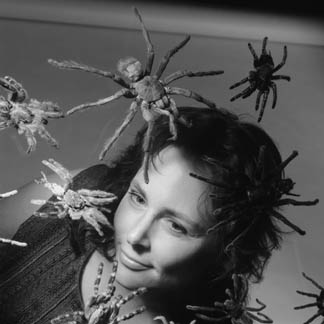From Darfur to poor neighborhoods, service-learning program reaches out
By Krishna Ramanujan

Service in the community is a large part of a group of Cornell courses in disciplines as diverse as history or landscape architecture. The courses also teach students about the meaning of citizenry.
All of these courses are part of the Faculty Fellows-in-Service (FFIS) program, whose aim is to combine the theory of service with the practical challenges of its application.
Both service and citizenry are at the heart of Cornell's land-grant mission to transfer knowledge from the university to the community and to open a dialogue between Cornell and people outside the campus.
"Cornell University is the New York state land-grant university and as such, to meet its stewardship responsibility, it must link the best of teaching and research, the classroom and academic studies with the betterment of our communities," said Leonardo Vargas-Mendez, director of Cornell's Public Service Center (PSC), which operates FFIS.
This fall semester, for example, John Weiss, associate professor of history, is introducing his class to international humanitarianism with a survey of the history of human rights and humanitarian movements. As a practical action, his students are assisting victims of genocide in Darfur in preserving their culture through creation of a Web site and a document library of cultural information, photos and videos. The students are also producing a film of American life, including football games, rallies and band practices, in which people hold signs in English and Arabic reading "Salaam Darfur," to show Americans' support. The film will be played in camps for Darfur refugees to give the victims "absolute proof that at least they are not suffering completely alone," Weiss said.
As an example of service closer to home, Cornell landscape architecture students in the Community Design Studio course have organized discussions in Binghamton, N.Y., with faith-based groups and residents to develop a plan for improving conditions in an impoverished neighborhood. The class, one of 35 service-learning courses taught each year in the FFIS program, road-tests theories and practices of engaged learning, participatory design and landscape architecture in neighborhoods. Community members participate as valued partners in defining, guiding and directing problem solving as the service-learning experience unfolds in the "messy" context of a real-world classroom.
"Imagine that you had the service experience but you missed the meaning," said Paula Horrigan, governance committee director of the FFIS and the landscape architecture professor who teaches Community Design Studio. "With a course like this, the meaning of the experience is the critical learning dimension of academic service-learning."
Horrigan's students are required to reflect on what they have learned by keeping a journal. They also face challenges, as theories may not hold up in real-world settings. At its core, the FFIS program teaches both faculty and students that members of the university have responsibilities as citizens.
The FFIS program, which began in 1993, teaches faculty members how to develop service-learning courses and offers mini-grants to support them, with the aim of creating a community of faculty versed in academic service-learning. An annual FFIS seminar provides a forum for faculty to present papers on service-learning pedagogy and create further opportunities for research projects. All of this "might elevate the activity of academic service-learning so it helps young scholars get tenure," Horrigan said.
Linda Rayor, a senior research associate in entomology, has used $1,000 in FFIS grants to buy supplies for her "Spider Outreach Program: Eight-legged Ambassadors for Science Education." Her students have taken spiders to classrooms in Ithaca, Trumansburg, Newfield, Lansing and Groton for discussions on the biology of arachnids. Developed by Rayor in 1998, the program has received FFIS funds since 2002 to pay for crickets to feed her spiders, insects for class visits and taxi money for students to visit schools.
"How wonderful it is to give back to the community," said Rayor, noting that her students have spoken to 385 groups and more than 13,000 children and adults since 1998. "But it is also fun to sell the science, because spiders and insects are totally alluring."
Weiss, Horrigan and Rayor have each received a Kaplan Family Distinguished Faculty Fellow in Service-Learning Award, given by the PSC to honor service-learning instruction that actively involves Cornell students in research, teaching and outreach efforts addressing important community-identified policy issues.
Although four colleges -- the College of Veterinary Medicine, the College of Agriculture and Life Sciences, the College of Human Ecology and the School of Industrial and Labor Relations -- operate as contract colleges through the state, along with the state-sponsored Agricultural Experiment Station at Geneva, all of Cornell is New York's land-grant university, as these service-learning programs illustrate.
Media Contact
Get Cornell news delivered right to your inbox.
Subscribe